Central Food Technological Research Institute (CFTRI), Mysuru, is one of the premier food laboratories in the country. Housed in the beautiful Cheluvamba Vilas (Cheluvamba Mansion) in the sprawling 145-acre campus, CSIR-CFTRI, in its 67 years of existence has had many charismatic Directors and achievements. Amul Baby Food is one such achievement. The current Director Prof. Ram Rajasekharan is also in the same league with his huge industry and academic accomplishments. However, he has been in the limelight sometimes for reasons beyond his control. Star of Mysore Features Editor N. Niranjan Nikam caught up with the affable, enigmatic Director at his plush office after he showed this writer around the campus and the changes he has brought in, including the renovation of the palatial building and new laboratories he has set up. In this free-wheeling interview, Prof. Rajasekharan, a highly decorated academician, talks about the contributions of all the Directors, his mission, his pro-farmer role and how much pro-Kannada he has always been. Excerpts…
By N. Niranjan Nikam
Star of Mysore (SOM): It is almost five years since you took over as the Director of CFTRI, one of the premier research institutions in the country. How has your experience been?
Prof. Ram Rajasekharan: I knew CSIR before coming here. This is one of the unique laboratories in biological sciences. We have ten laboratories, this is one of the biggest ones, and with respect to total area, CFTRI has 145 acres of land plus another 98 acres and the largest number of people, permanent staff working here. Maintaining a laboratory of this size is really difficult because when I was in Lucknow before coming here, it was almost half the size of this laboratory and was easy to maintain. The volume of operations is two times here.
This is the area most familiar to me because I have specialised in fats and oils all my life — mostly cooking oil. I must tell you here that I am a well-known academician across the globe and a highly decorated academician in the nation. Nobody with this kind of recognition has taken charge as the Director of this organisation till now, including the Founder-Director Dr. V. Subrahmanyan, where we are both from the Department of Bio-Chemistry at the Indian Institute of Science.
I am the only Director, who has been appointed here, who has been elected in all the Indian Academies of Biological Sciences in the country. We are talking here in terms of Basic and Applied Science. I have nothing do with medical and engineering.
SOM: You have said that you brought focus to food and food processing related research programmes. Was it not the focus earlier?
Prof. Rajasekharan: No, it was not the focus earlier. I have to narrate to you from the birth of the organisation. The entire concept of really developing an organisation like CFTRI was actually written at the Indian Institute of Science that included the thought process and concept paper. That is why the first Director is from there.
The first Director Dr. V. Subrahmanyan started the Institute with two main focus in 1950 — one is post-harvest losses should be minimised in this country, take the grains, fruits and vegetable after harvesting and the second was we should eliminate or alleviate protein deficiency or protein mal-deficiency in the country.
We have done extraordinarily well with respect to minimising post-harvest losses. We have also as an organisation provided technology for more than 65 per cent of total food processing, which is currently adopted by the nation. But we have done very little as far as the second part, the protein deficiency malnutrition is concerned.
My superior asked me to take over this organisation and he also cautioned me, that there is less Science and more Politics in the organisation, before taking over.
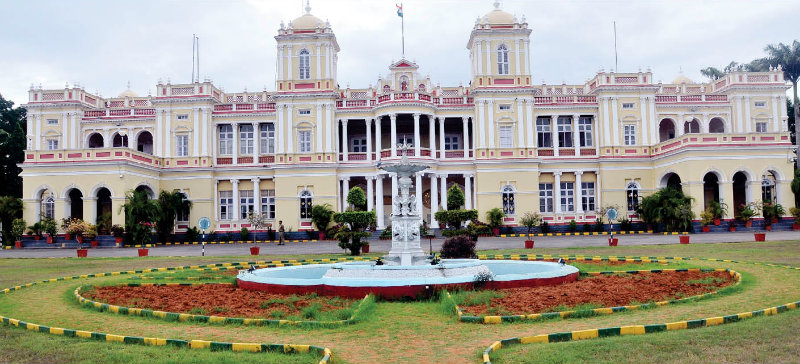
SOM: This is fantastic. I am sure you have not said this before?
Prof. Rajasekharan: Generally I do not say many things nor I have said it before, because I do not like to talk. This is my main focus and my interest is taking the Institute in this direction. However, what is happening is there is less Science and more Politics in the organisation, which I want to reverse. I came here with this mission.
Sadly, the politics started before I joined the organisation. Right before I took charge they had arranged a dharna. Finally, I managed to take over and see that my mission is accomplished.
SOM: The first Director of the Institute was Dr. V. Subrahmanyan. Many well-known Directors of the likes of Dr. H.A.B. Parpia, Dr. Amla, Dr. V. Prakash have followed him. Early Mysureans can remember the contribution of Amul Baby food by a team led by Scientist M.R. Chandrashekara. What is the growth trajectory of the institute from then in the last six decades?
Prof. Rajasekharan: Many Directors came and each one had their own focus. The Founder-Director also did a great contribution with respect to rice — par boiled rice processing — they don’t mill the paddy, they cook the paddy, dry it and then mill it. This organisation literally grew from nothing to a very high standard because of the commitment from the scientists. I still respect their contribution at the starting point.
That was the vision with which it was started. Then many people managed the entire concept but no new Science was brought in after the initial period of 15 to 20 years. But they brought in new focus because they were not strong in Science but in practicing Science and developed technologies. That is why we call it food technology. New schools were opened like the wheat milling international school and trained people who are in the industry. This was done very well during both Directors Dr. H.A.B. Parpia and Dr. B.L. Amla’s time. It was Science that was brought by the first Director and technology was brought by the other two.
But there came a time when we realised that food can be a subject of research and it also solves problems of millions of people by preserving food. Now, the culture of technology has come in and processing has reached a certain amount of perfection. People have started asking why I should worry about grains, let me have food ready to eat, drink, to serve, we call it fast food culture.
For people’s convenience — convenient foods like bisibele bath, readymade chapatis, idlis, vadas, dosas, were brought very effectively during Dr. Bhowmick’s time as he came from the US where fast food was very popular. Then Dr V. Prakash continued this entire programme. His great contribution was very notable — it was to create standards for global testing facility going to the Food Safety Laboratory, to see how safe the food is. He has galvanised that part. From convenience food, he moved to Nutraceuticals (like caffeine is nutraceutical, while coffee is food), as he was there for a long time. This is when I came in and my mission was to practice Science, which is continuing.
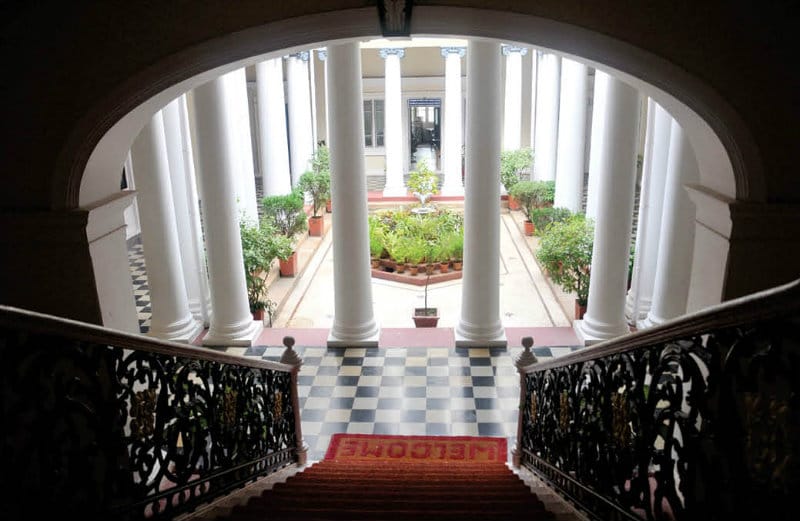
The royal courtyard of Cheluvamba Vilas that houses CFTRI
SOM: Farmers issues are plaguing the country. As an institute into food research, what role is CFTRI playing to mitigate their problems?
Prof. Rajasekharan: Till I came into the organisation, no farmer had entered the campus. You can go back and refer history. I am from a farming community. The farming community job is to produce food and my job is to produce better quality food. Here I have to go back to the second point of not addressing the protein deficiency malnutrition issue.
We tried introducing palm oil in 1995 but we failed. To address the protein part of the problem the last crop we successfully introduced was soya bean. Then we prepared the food to fight protein deficiency malnutrition. People did not like the flavour. It really didn’t serve the mission of the nation. That is where we have come in now.
Our population is also growing. Food scarcity is going to come in the future. Everybody is scared. The best way to solve this problem is, if everybody is a vegetarian then there is no problem till 2050. Because of the whole of agriculture practice, close to 50 per cent of the land is used to grow maize or corn. The amount of corn or maize human eats is very less. This is fed to animals. We eat the animal. 50 per cent of the land is used to feed the animals. Instead, if we consume everything directly, where is the problem?
People decided to eat meat because protein deficiency is very high. Hence, we have to find a crop that is both rich in protein and starch together. Instead of animal protein when I can give quality plant protein, that is where we decided, I want a grain, which God has created with good quality protein and starch. However, millet consumption has come down and rice-wheat related products have gone up.
Let us look at agriculture with a global perspective, not a localised one. Everybody is under the impression that ragi is our food. But actually it came from Ethiopia and the credit goes to Karnataka farmers for introducing it to the country. They are the first State to adopt ragi in this nation. They are one of the biggest growers and consumers.
Another great introduction was mulberry and that is why Mysuru is called the ‘Silk City.’ There is no one next to Karnataka to bring newer things for the nation. The farmers know how to adopt. Our farmers are extremely good and they know how to make livelihood out of unknown. Give them anything new they make it real.
CSIR-CFTRI is introducing Chia to Indian farmers for cultivation for the first time and it has developed two high yielding white seed varieties. You know why we have developed white seeds because Indians do not like black! Mysuru farmers produce it. We give ID for every one of the crop to know it is ours. That is the reason our farmers are happy.
SOM: Being a research institute, how much of industry-institute interaction is seen?
Prof. Rajasekharan: I have been trained in the industry before I became an academician. Because of my poverty, I had to go back to the industry and I come back to academia once my money requirement is fulfilled. I have gone back to the industry many times, worked for companies like DuPont, Monsanto. Hence, I have been trained well in the industry and new Science to create new products. Nobody could make ice-cream which is Omega-3 fatty acids, which is the first product and we are the first to make in the whole world. We need a new Science to create new products. We have developed technologies for several commercially attractive, nutritionally superior and safe products for adoption by tiny, small, medium and large food processing sectors.
Another new product which our Prime Minister wanted was carbonated juice which should be incorporated with nutrition and he defined nutrition should come from the fruit juice. Nobody made it but we did. All others are flavoured water but ours is 20 per cent fruit juice. We should all feel proud working here in CFTRI because we live in a Palace.
SOM: Coming to the vexed issue and the charge of you being anti-Kannada, what is your response?
Prof. Rajasekharan: I have looked at the organisation, their performance and non-performance, institution-loyalty and non-loyal to institution. We have close to 85 per cent population from Karnataka. By mere chance factor some of them are people from other States who have been sent here. I can give you facts. Why do they create problems? I do not know. I can say that my entire career is built in this State. I am a student of IISc. If I am anti-Kannada, how could I have been in this State? I have received many awards from this State, how could it have all happened? Now you decide and tell me what I am? My view is I am not anti-Kannada. I love this place and cherish living here.
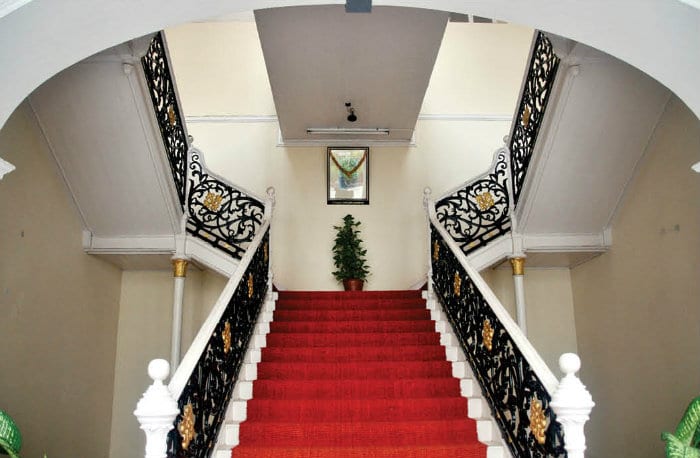
The majestic stairs leading to the Director’s Chamber
SOM: CFTRI is a national institute and people from all over the country work here. How do you tackle the visits of Kannada Development Authority-led team in finding fault in the way you work regarding Kannadigas?
Prof. Rajasekharan: If somebody wants to come and see, that is his or her right to come. They suggested you do this, this…I agreed in implementing the language in the campus. If you look at the literature, not a single time in the past so much importance was given to Kannada. It has happened only during my time. There was not a single calendar in Kannada, it is there now. I have a website in Kannada, which many organisations do not have. I have addressed the issue of KDA wanting to set up a Kannada Cell in the office. The responsibility of the Cell is to celebrate all the functions related to Kannada. We celebrate the whole year. Even Dr. Rajkumar’s birthday among the celebrations is official. I don’t know where I went wrong. People say it is an eyewash. They have never verified, including the media who have also abused me. I want to see that journalism is practiced the way it should be. They have to present facts.
There is a fact-finding committee and no less than three times they have looked at my records and found me clean every time. I am probably the only person in the nation to whom this has happened. But the journalists write all kinds of things without verifying. A Parliamentary Committee said that I am doing a good job. Why can’t you accept I am real and they are wrong?
SOM: There is a pro and anti-Director group both within and outside the Institute. Please comment.
Prof. Rajasekharan: Outside I don’t care. I am here to run the organisation. I am clean, aggressive and do my job. I want to be an intellectual. I am not here to feed their greed and I don’t get bogged down by all kinds of allegations. My caste can be questioned but they cannot question my morals and integrity. Does Science have a language? You want to fight with me, fight if you know Science. Then I will fight till death because that is my strength.



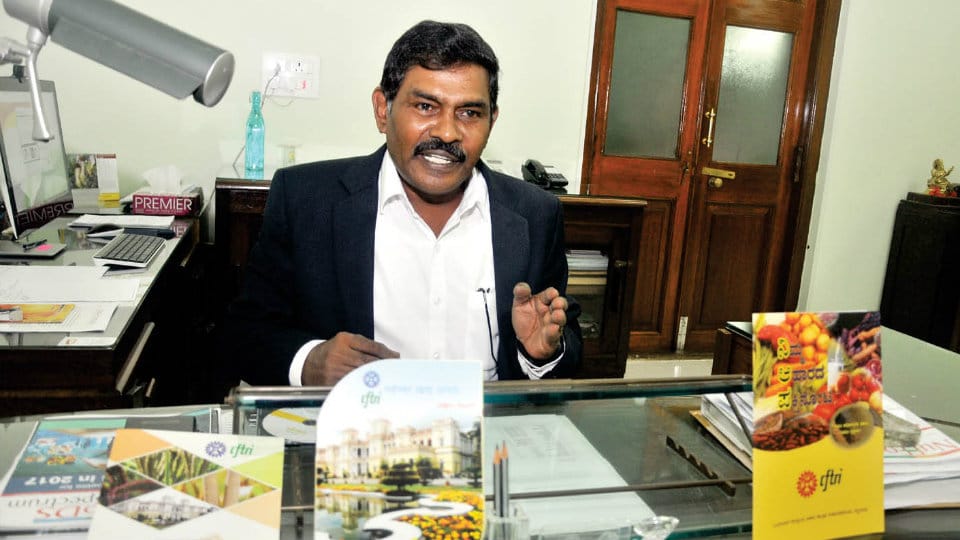
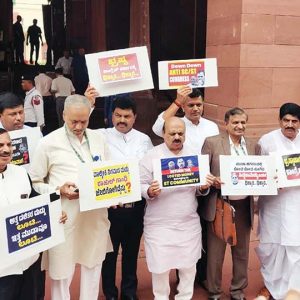
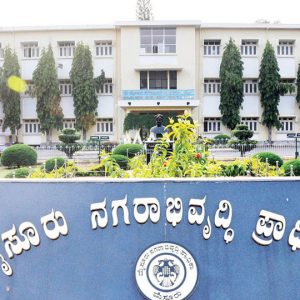
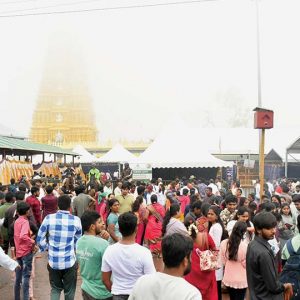
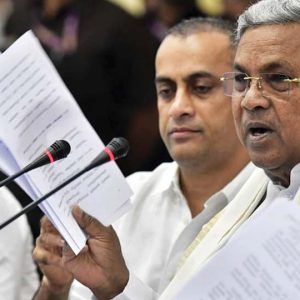
Jai Jawan, Jai Kishan and Jai Vigyan
I appreciate his vision for science and its role in addressing various societal problems. He truly deserves all credit’s for building image of CSIR-CFTRI in National and international platform. I have seen all qualities of good human within you since my first interaction. Hats off to Prof Ram for his contributions.